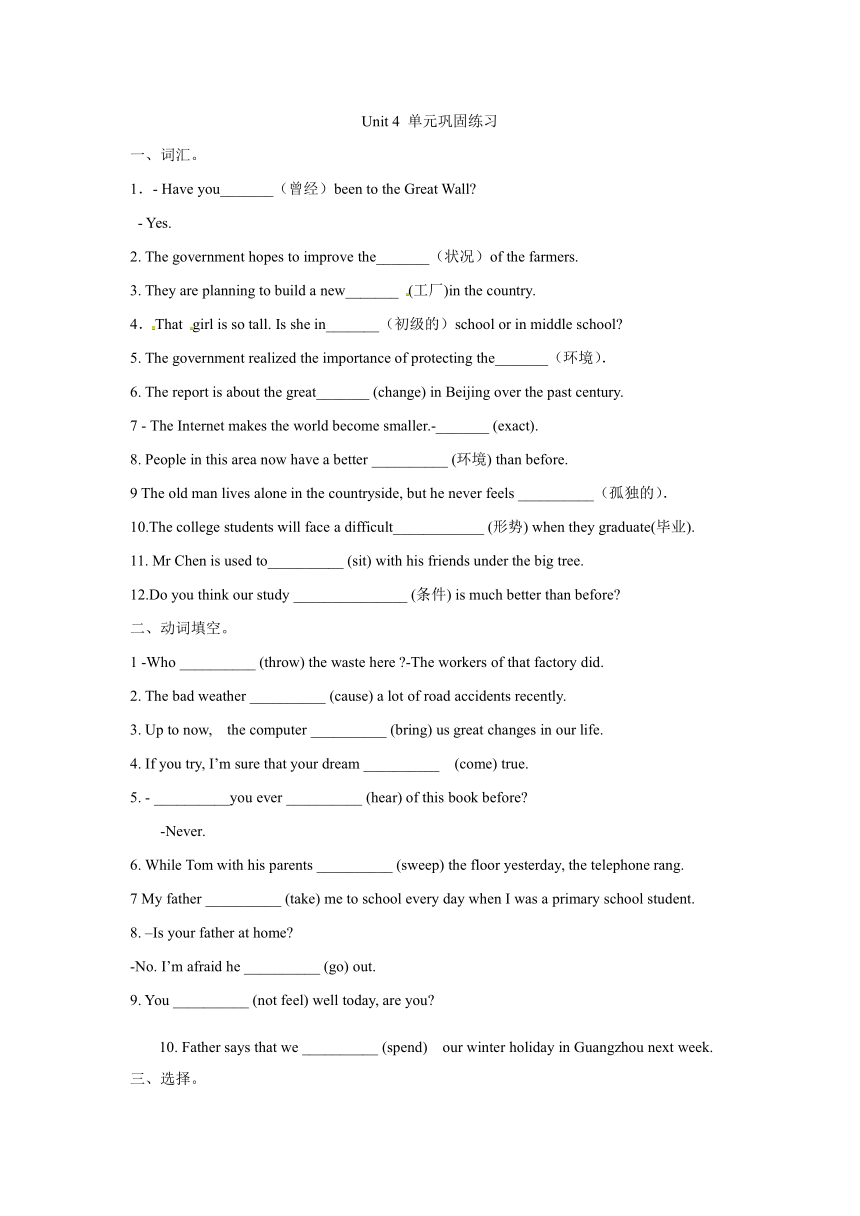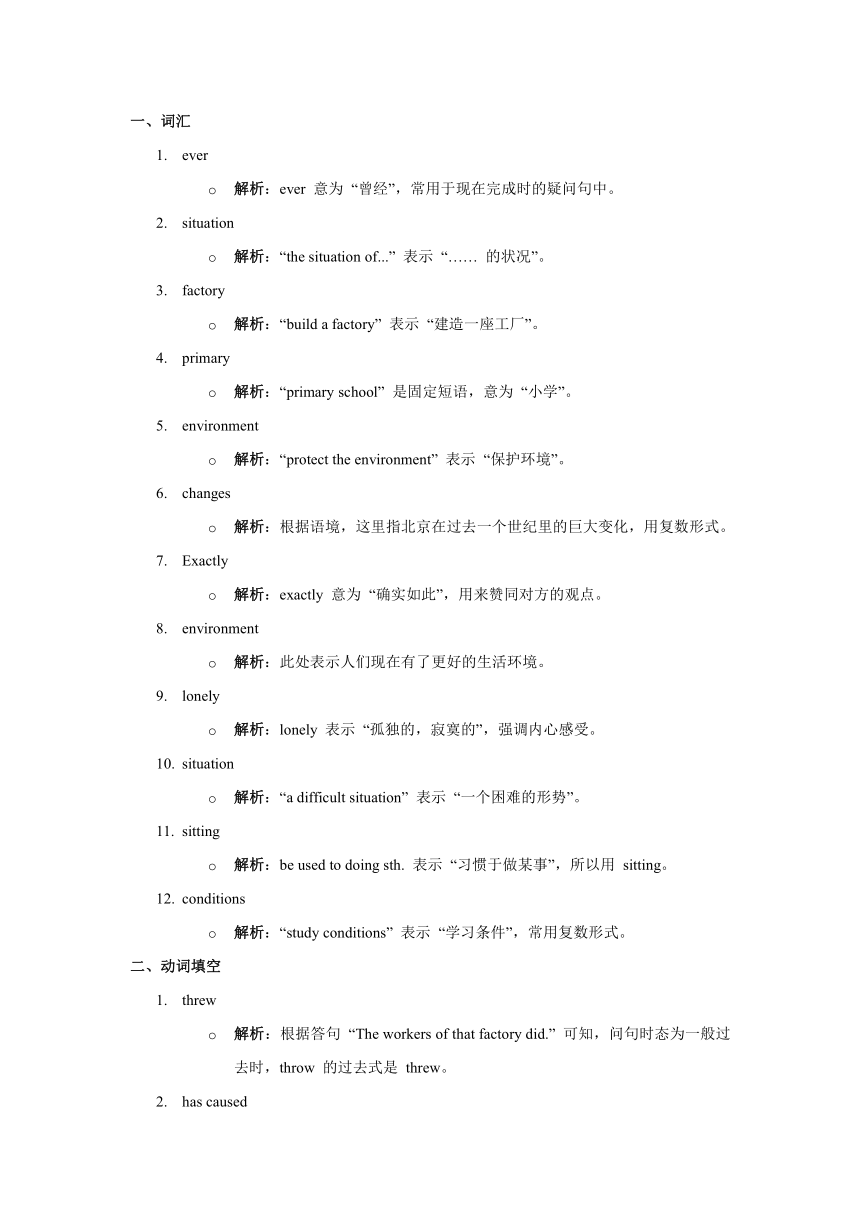Unit4 A good read单元巩固练习(含答案)牛津译林版八年级英语下册
文档属性
| 名称 | Unit4 A good read单元巩固练习(含答案)牛津译林版八年级英语下册 |

|
|
| 格式 | docx | ||
| 文件大小 | 31.9KB | ||
| 资源类型 | 教案 | ||
| 版本资源 | 牛津译林版 | ||
| 科目 | 英语 | ||
| 更新时间 | 2025-02-12 00:00:00 | ||
图片预览



文档简介
Unit 4 单元巩固练习
词汇。
1.- Have you_______(曾经)been to the Great Wall
- Yes.
2. The government hopes to improve the_______(状况)of the farmers.
3. They are planning to build a new_______ (工厂)in the country.
4.That girl is so tall. Is she in_______(初级的)school or in middle school
5. The government realized the importance of protecting the_______(环境).
6. The report is about the great_______ (change) in Beijing over the past century.
7 - The Internet makes the world become smaller.-_______ (exact).
8. People in this area now have a better __________ (环境) than before.
9 The old man lives alone in the countryside, but he never feels __________(孤独的).
10.The college students will face a difficult____________ (形势) when they graduate(毕业).
11. Mr Chen is used to__________ (sit) with his friends under the big tree.
12.Do you think our study _______________ (条件) is much better than before
动词填空。
1 -Who __________ (throw) the waste here -The workers of that factory did.
2. The bad weather __________ (cause) a lot of road accidents recently.
3. Up to now, the computer __________ (bring) us great changes in our life.
4. If you try, I’m sure that your dream __________ (come) true.
5. - __________you ever __________ (hear) of this book before
-Never.
6. While Tom with his parents __________ (sweep) the floor yesterday, the telephone rang.
7 My father __________ (take) me to school every day when I was a primary school student.
8. –Is your father at home
-No. I’m afraid he __________ (go) out.
9. You __________ (not feel) well today, are you
10. Father says that we __________ (spend) our winter holiday in Guangzhou next week.
选择。
( )1.I have bought a Chinese – English dictionary When and where_____ you _____ it
A. have, bought B. did, buy C. will, buy D. do, buy
( ) 2. He has kept in touch with us .
A. since a month B. for a month C. for a month ago D. in a month
( ) 3._____great fun it is to fly in a balloon!
A. What B. What a C. How a D. How
( )4.My son _____ up yet because he _____ to bed very late last night.
A. hasn’t got; has gone B. didn’t get; went C. doesn’t get; went D. hasn’t got; went
( )5.—Do you mind my sitting here —___________.The woman sitting here has just left.
A. You’d better not. B. Of course not C. Yes, please D. No, you can’t
( )6. He has ________ finished his homework, but he hasn't washed his feet______.
A. already; already B. just; already C. yet; yet D. just; yet
( )7. To learn English better, you'd better speak English_______ you can,
A. as often as B, as many as C. so often as D. so many as
完成句子。
1 这儿过去有一大片开阔的空地。
There ________________________________________ here.
2. 我们习惯于写信保持联系而不是网上聊天。
We _______________________________ instead of chatting on the Internet.
3. 他已经意识到学习英语的重要性了。
He’s _____________________________ learning English already.
4. 地铁已经使得进出城市更加便利。
The underground has _________________________________.
5.离开家两年多,他十分思念父母。
He _________ for over two years. He misses his parents very much.
6.他已经决定出国深造,是吗? He _______________________________________.
7.我妈妈最近习惯通过QQ和我交流。
My mother________________________________________ recently.
一、词汇
ever
解析:ever 意为 “曾经”,常用于现在完成时的疑问句中。
situation
解析:“the situation of...” 表示 “…… 的状况”。
factory
解析:“build a factory” 表示 “建造一座工厂”。
primary
解析:“primary school” 是固定短语,意为 “小学”。
environment
解析:“protect the environment” 表示 “保护环境”。
changes
解析:根据语境,这里指北京在过去一个世纪里的巨大变化,用复数形式。
Exactly
解析:exactly 意为 “确实如此”,用来赞同对方的观点。
environment
解析:此处表示人们现在有了更好的生活环境。
lonely
解析:lonely 表示 “孤独的,寂寞的”,强调内心感受。
situation
解析:“a difficult situation” 表示 “一个困难的形势”。
sitting
解析:be used to doing sth. 表示 “习惯于做某事”,所以用 sitting。
conditions
解析:“study conditions” 表示 “学习条件”,常用复数形式。
二、动词填空
threw
解析:根据答句 “The workers of that factory did.” 可知,问句时态为一般过去时,throw 的过去式是 threw。
has caused
解析:由 “recently” 可知,句子时态为现在完成时,结构是 “have/has + 过去分词”,主语是 “The bad weather”,用 has,cause 的过去分词是 caused。
has brought
解析:“Up to now” 是现在完成时的标志,computer 是第三人称单数,用 has,bring 的过去分词是 brought。
will come
解析:“if” 引导的条件状语从句,遵循 “主将从现” 原则,从句是一般现在时,主句用一般将来时,结构是 “will + 动词原形”。
Have; heard
解析:“before” 常与现在完成时连用,一般疑问句结构是 “Have/Has + 主语 + 过去分词 + 其他”,主语是 you,用 Have,hear 的过去分词是 heard。
was sweeping
解析:“while” 引导的时间状语从句,强调主句动作正在进行时,从句动作发生,根据 “yesterday” 和 “rang” 可知,主句用过去进行时,结构是 “was/were + 现在分词”,“with his parents” 是伴随状语,主语是 Tom,用 was,sweep 的现在分词是 sweeping。
took
解析:根据 “when I was a primary school student” 可知,句子时态为一般过去时,take 的过去式是 took。
has gone
解析:根据语境可知,父亲出去了还没回来,用现在完成时,结构是 “have/has + 过去分词”,主语是 he,用 has,go 的过去分词是 gone。
aren't feeling
解析:根据反意疑问句 “are you” 可知,前半句时态是现在进行时,结构是 “be + 现在分词”,主语是 You,用 aren't,feel 的现在分词是 feeling。
will spend
解析:根据 “next week” 可知,句子时态为一般将来时,结构是 “will + 动词原形”。
三、选择
答案:B
解析:问句询问买字典的时间和地点,是过去发生的动作,用一般过去时,其结构是 “Did + 主语 + 动词原形 + 其他”,故选 B。
答案:B
解析:“for + 时间段” 常与现在完成时连用,A 选项 “since a month” 表述错误,应该是 “since a month ago”;C 选项 “for a month ago” 表述错误;D 选项 “in a month” 用于一般将来时,故选 B。
答案:A
解析:感叹句结构有 “What + (a/an) + 形容词 + 可数名词单数 + 其他成分!”“What + 形容词 + 可数名词复数 / 不可数名词 + 其他成分!”“How + 形容词 / 副词 + 其他成分!”,句中 “fun” 是不可数名词,用 What 引导感叹句,故选 A。
答案:D
解析:“yet” 常用于现在完成时的否定句中,所以第一空用现在完成时,结构是 “hasn't + 过去分词”;“last night” 是过去时间,第二空用一般过去时,go 的过去式是 went,故选 D。
答案:B
解析:根据 “The woman sitting here has just left.” 可知,不介意对方坐在这里,A 选项 “你最好不要”;C 选项 “是的,请坐(前后矛盾)”;D 选项 “不,你不能”,均不符合语境,B 选项 “当然不” 符合,故选 B。
答案:D
解析:already 常用于肯定句,yet 常用于否定句和疑问句,just 表示 “刚刚”,可用于肯定句,第一空表示 “刚刚完成”,用 just,第二空是否定句,用 yet,故选 D。
答案:A
解析:“as often as you can” 表示 “尽可能经常地”,修饰动词 speak,B 选项 “as many as” 修饰可数名词复数;C 选项 “so often as” 常用于否定句;D 选项 “so many as” 修饰可数名词复数,故选 A。
四、完成句子
used to be a large open space
解析:“used to be...” 表示 “过去曾经有……”。
are used to writing letters to keep in touch
解析:“be used to doing sth.” 表示 “习惯于做某事”,“write letters to keep in touch” 表示 “写信保持联系”。
realized the importance of
解析:“realize the importance of...” 表示 “意识到…… 的重要性”,根据 “already” 可知用现在完成时。
made it more convenient to get in and out of the city
解析:“make it + 形容词 + to do sth.” 表示 “使做某事……”,“get in and out of the city” 表示 “进出城市”。
has been away from home
解析:“for over two years” 表示一段时间,leave 是短暂性动词,要转化为延续性动词短语 “be away from”,用现在完成时。
has decided to go abroad for further study, hasn't he
解析:“decide to do sth.” 表示 “决定做某事”,“go abroad for further study” 表示 “出国深造”,反意疑问句遵循 “前肯后否” 原则,前半句是现在完成时,用 has,所以反意疑问句用 hasn't he。
has been used to communicating with me through QQ
解析:“be used to doing sth.” 表示 “习惯于做某事”,“communicate with sb. through...” 表示 “通过…… 和某人交流”,根据 “recently” 可知用现在完成时。
词汇。
1.- Have you_______(曾经)been to the Great Wall
- Yes.
2. The government hopes to improve the_______(状况)of the farmers.
3. They are planning to build a new_______ (工厂)in the country.
4.That girl is so tall. Is she in_______(初级的)school or in middle school
5. The government realized the importance of protecting the_______(环境).
6. The report is about the great_______ (change) in Beijing over the past century.
7 - The Internet makes the world become smaller.-_______ (exact).
8. People in this area now have a better __________ (环境) than before.
9 The old man lives alone in the countryside, but he never feels __________(孤独的).
10.The college students will face a difficult____________ (形势) when they graduate(毕业).
11. Mr Chen is used to__________ (sit) with his friends under the big tree.
12.Do you think our study _______________ (条件) is much better than before
动词填空。
1 -Who __________ (throw) the waste here -The workers of that factory did.
2. The bad weather __________ (cause) a lot of road accidents recently.
3. Up to now, the computer __________ (bring) us great changes in our life.
4. If you try, I’m sure that your dream __________ (come) true.
5. - __________you ever __________ (hear) of this book before
-Never.
6. While Tom with his parents __________ (sweep) the floor yesterday, the telephone rang.
7 My father __________ (take) me to school every day when I was a primary school student.
8. –Is your father at home
-No. I’m afraid he __________ (go) out.
9. You __________ (not feel) well today, are you
10. Father says that we __________ (spend) our winter holiday in Guangzhou next week.
选择。
( )1.I have bought a Chinese – English dictionary When and where_____ you _____ it
A. have, bought B. did, buy C. will, buy D. do, buy
( ) 2. He has kept in touch with us .
A. since a month B. for a month C. for a month ago D. in a month
( ) 3._____great fun it is to fly in a balloon!
A. What B. What a C. How a D. How
( )4.My son _____ up yet because he _____ to bed very late last night.
A. hasn’t got; has gone B. didn’t get; went C. doesn’t get; went D. hasn’t got; went
( )5.—Do you mind my sitting here —___________.The woman sitting here has just left.
A. You’d better not. B. Of course not C. Yes, please D. No, you can’t
( )6. He has ________ finished his homework, but he hasn't washed his feet______.
A. already; already B. just; already C. yet; yet D. just; yet
( )7. To learn English better, you'd better speak English_______ you can,
A. as often as B, as many as C. so often as D. so many as
完成句子。
1 这儿过去有一大片开阔的空地。
There ________________________________________ here.
2. 我们习惯于写信保持联系而不是网上聊天。
We _______________________________ instead of chatting on the Internet.
3. 他已经意识到学习英语的重要性了。
He’s _____________________________ learning English already.
4. 地铁已经使得进出城市更加便利。
The underground has _________________________________.
5.离开家两年多,他十分思念父母。
He _________ for over two years. He misses his parents very much.
6.他已经决定出国深造,是吗? He _______________________________________.
7.我妈妈最近习惯通过QQ和我交流。
My mother________________________________________ recently.
一、词汇
ever
解析:ever 意为 “曾经”,常用于现在完成时的疑问句中。
situation
解析:“the situation of...” 表示 “…… 的状况”。
factory
解析:“build a factory” 表示 “建造一座工厂”。
primary
解析:“primary school” 是固定短语,意为 “小学”。
environment
解析:“protect the environment” 表示 “保护环境”。
changes
解析:根据语境,这里指北京在过去一个世纪里的巨大变化,用复数形式。
Exactly
解析:exactly 意为 “确实如此”,用来赞同对方的观点。
environment
解析:此处表示人们现在有了更好的生活环境。
lonely
解析:lonely 表示 “孤独的,寂寞的”,强调内心感受。
situation
解析:“a difficult situation” 表示 “一个困难的形势”。
sitting
解析:be used to doing sth. 表示 “习惯于做某事”,所以用 sitting。
conditions
解析:“study conditions” 表示 “学习条件”,常用复数形式。
二、动词填空
threw
解析:根据答句 “The workers of that factory did.” 可知,问句时态为一般过去时,throw 的过去式是 threw。
has caused
解析:由 “recently” 可知,句子时态为现在完成时,结构是 “have/has + 过去分词”,主语是 “The bad weather”,用 has,cause 的过去分词是 caused。
has brought
解析:“Up to now” 是现在完成时的标志,computer 是第三人称单数,用 has,bring 的过去分词是 brought。
will come
解析:“if” 引导的条件状语从句,遵循 “主将从现” 原则,从句是一般现在时,主句用一般将来时,结构是 “will + 动词原形”。
Have; heard
解析:“before” 常与现在完成时连用,一般疑问句结构是 “Have/Has + 主语 + 过去分词 + 其他”,主语是 you,用 Have,hear 的过去分词是 heard。
was sweeping
解析:“while” 引导的时间状语从句,强调主句动作正在进行时,从句动作发生,根据 “yesterday” 和 “rang” 可知,主句用过去进行时,结构是 “was/were + 现在分词”,“with his parents” 是伴随状语,主语是 Tom,用 was,sweep 的现在分词是 sweeping。
took
解析:根据 “when I was a primary school student” 可知,句子时态为一般过去时,take 的过去式是 took。
has gone
解析:根据语境可知,父亲出去了还没回来,用现在完成时,结构是 “have/has + 过去分词”,主语是 he,用 has,go 的过去分词是 gone。
aren't feeling
解析:根据反意疑问句 “are you” 可知,前半句时态是现在进行时,结构是 “be + 现在分词”,主语是 You,用 aren't,feel 的现在分词是 feeling。
will spend
解析:根据 “next week” 可知,句子时态为一般将来时,结构是 “will + 动词原形”。
三、选择
答案:B
解析:问句询问买字典的时间和地点,是过去发生的动作,用一般过去时,其结构是 “Did + 主语 + 动词原形 + 其他”,故选 B。
答案:B
解析:“for + 时间段” 常与现在完成时连用,A 选项 “since a month” 表述错误,应该是 “since a month ago”;C 选项 “for a month ago” 表述错误;D 选项 “in a month” 用于一般将来时,故选 B。
答案:A
解析:感叹句结构有 “What + (a/an) + 形容词 + 可数名词单数 + 其他成分!”“What + 形容词 + 可数名词复数 / 不可数名词 + 其他成分!”“How + 形容词 / 副词 + 其他成分!”,句中 “fun” 是不可数名词,用 What 引导感叹句,故选 A。
答案:D
解析:“yet” 常用于现在完成时的否定句中,所以第一空用现在完成时,结构是 “hasn't + 过去分词”;“last night” 是过去时间,第二空用一般过去时,go 的过去式是 went,故选 D。
答案:B
解析:根据 “The woman sitting here has just left.” 可知,不介意对方坐在这里,A 选项 “你最好不要”;C 选项 “是的,请坐(前后矛盾)”;D 选项 “不,你不能”,均不符合语境,B 选项 “当然不” 符合,故选 B。
答案:D
解析:already 常用于肯定句,yet 常用于否定句和疑问句,just 表示 “刚刚”,可用于肯定句,第一空表示 “刚刚完成”,用 just,第二空是否定句,用 yet,故选 D。
答案:A
解析:“as often as you can” 表示 “尽可能经常地”,修饰动词 speak,B 选项 “as many as” 修饰可数名词复数;C 选项 “so often as” 常用于否定句;D 选项 “so many as” 修饰可数名词复数,故选 A。
四、完成句子
used to be a large open space
解析:“used to be...” 表示 “过去曾经有……”。
are used to writing letters to keep in touch
解析:“be used to doing sth.” 表示 “习惯于做某事”,“write letters to keep in touch” 表示 “写信保持联系”。
realized the importance of
解析:“realize the importance of...” 表示 “意识到…… 的重要性”,根据 “already” 可知用现在完成时。
made it more convenient to get in and out of the city
解析:“make it + 形容词 + to do sth.” 表示 “使做某事……”,“get in and out of the city” 表示 “进出城市”。
has been away from home
解析:“for over two years” 表示一段时间,leave 是短暂性动词,要转化为延续性动词短语 “be away from”,用现在完成时。
has decided to go abroad for further study, hasn't he
解析:“decide to do sth.” 表示 “决定做某事”,“go abroad for further study” 表示 “出国深造”,反意疑问句遵循 “前肯后否” 原则,前半句是现在完成时,用 has,所以反意疑问句用 hasn't he。
has been used to communicating with me through QQ
解析:“be used to doing sth.” 表示 “习惯于做某事”,“communicate with sb. through...” 表示 “通过…… 和某人交流”,根据 “recently” 可知用现在完成时。
